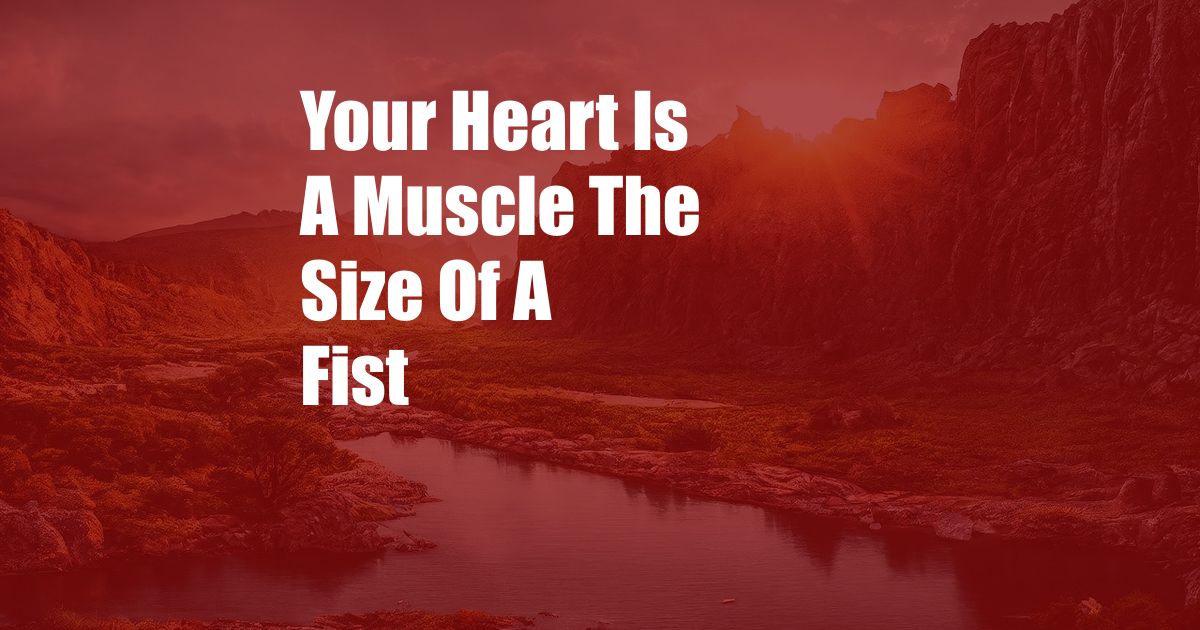
Your Heart: A Powerhouse Muscle the Size of a Fist
Your heart, a vital organ that beats tirelessly within your chest, is a marvel of nature. It’s a muscle, about the size of your fist, that pumps life-sustaining blood throughout your body. Every beat, every pump, keeps you alive. But beyond its mechanical function, the heart holds a special place in our culture and imagination. It’s a symbol of love, passion, and courage. And for good reason: your heart is an extraordinary organ that plays a pivotal role in your overall health and well-being.
The Heart: A Mighty Pump
The heart is a four-chambered pump that consists of two atria (upper chambers) and two ventricles (lower chambers). The atria receive blood from the body and pump it to the ventricles, which then contract to pump blood out to the body and lungs. The heart’s contractions are regulated by electrical impulses generated by the sinoatrial node, also known as the heart’s natural pacemaker.
The Heart and Blood Circulation
The heart’s primary function is to circulate blood throughout the body. Blood carries oxygen and nutrients to cells while removing waste products. The heart’s pumping action ensures that this vital fluid reaches every part of your body, from your head to your toes.
The Heart’s Electrical System
The heart’s electrical system is responsible for coordinating its contractions. The sinoatrial node generates electrical impulses that travel through the atria, causing them to contract and fill the ventricles. These impulses then reach the atrioventricular node, which delays the impulses slightly before sending them down the bundle of His, a network of fibers that carries the impulses to the ventricles, causing them to contract and pump blood out to the body and lungs.
The Heart and Exercise
Regular exercise has a profound impact on your heart health. Aerobic activities, such as running or swimming, strengthen the heart muscle and improve its ability to pump blood. Exercise also reduces your risk of developing heart disease by lowering blood pressure, improving cholesterol levels, and reducing inflammation.
Tips and Expert Advice for a Healthy Heart
Maintaining a healthy heart requires a holistic approach that includes a healthy diet, regular exercise, stress management, and avoiding tobacco and excessive alcohol consumption. Here are some expert tips for keeping your heart healthy:
- Eat a heart-healthy diet: Focus on consuming fruits, vegetables, whole grains, lean protein, and healthy fats. Limit processed foods, saturated fats, and sodium.
- Get regular exercise: Aim for at least 150 minutes of moderate-intensity aerobic activity or 75 minutes of vigorous-intensity aerobic activity per week.
- Manage stress: Chronic stress can increase your risk of heart disease. Engage in stress-reducing activities like yoga, meditation, or spending time in nature.
- Avoid tobacco and excessive alcohol consumption: Smoking and excessive alcohol consumption are major risk factors for heart disease. Quit smoking and limit alcohol intake to moderate levels.
FAQ on Heart Health
Q: What are the symptoms of a heart attack?
A: Chest pain or discomfort, shortness of breath, pain or discomfort in the arms, neck, back, or jaw, nausea, dizziness, or cold sweats.
Q: What is the difference between a heart attack and a stroke?
A: A heart attack occurs when blood flow to the heart is blocked, while a stroke occurs when blood flow to the brain is blocked.
Q: What are the risk factors for heart disease?
A: High blood pressure, high cholesterol, diabetes, obesity, smoking, excessive alcohol consumption, and physical inactivity.
Conclusion
Your heart is a remarkable organ that plays a vital role in your overall health and well-being. By understanding its structure, function, and importance, you can take steps to care for your heart and enjoy a long, healthy life. Remember, your heart is a muscle that requires care and attention. By following these expert tips and making healthy lifestyle choices, you can keep your heart healthy and strong for years to come.
Are you interested in learning more about heart health? If so, feel free to explore the links below for additional information.